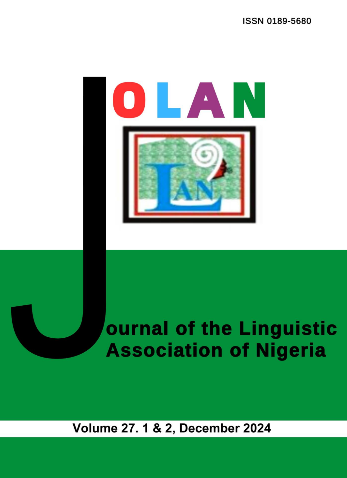Face threatening Acts and Politeness Strategies in a Nigerian Quasi-Judicial Public Hearing
Keywords:
Face threatening acts, Nigeria, Politeness strategies, Quasi-judicial public hearingAbstract
Previous studies have addressed negative politeness strategies in investigative hearings without addressing other types of politeness strategies used in the hearings. Using Brown and Levinson's model of politeness strategies, this paper focused on the different types of politeness strategies used by participants in the 2008 quasi-judicial public hearing on Federal Capital Territory administration in Nigeria. The data comprised forty purposively sampled video recordings of the hearing, obtained from the African Independent Television, Nigeria. Three politeness strategies were deployed at different stages of the interaction, face-threatening acts on record without redress, face threatening-acts on record using positive politeness, face- threatening acts using off-record politeness. The paper argues that the interactants' goals, relationship between the interactants, as well as the structure and context of the quasi-judicial public hearing affects the language used in the hearing.
References
Anthonissen, C.(2006). Critical discourse analysis as an analytic tool in considering selected prominent features of TRC testimonies. Journal of Language and Politics, 5 (1), 171-96.
Berlin, L. N. (2007). Cooperative conflict and evasive language: The case of the 9–11 Commission Hearings.In A. Fetza (ed.), Context and Appropriateness (pp.167–199).Amsterdam: John Benjamins Publishing Company.
Berlin, L. N. (2011). Redundancy and markers of belief in the discourse of political hearings. Language Sciences, 33, 268–279.
Bernard, T. (2009). Justificatory Discourse of the Perpetrator in TRC Testimonies:A discoursehistorical Analysis. Unpublished MA Thesis. Stellenbosch University.
Blommaert, J., Bock, M.& McCormick, K. (2006). Narrative inequality in the TRC hearings: On the hearability of hidden transcripts.Journal of Language and Politics, 5 (1), 37-70.
Bock, Z. (2007). A Discourse Analysis of Selected Truth and Reconciliation Commission Testimonies: Appraisal and Genre. Unpublished PhD thesis. University of the Western Cape.
Bock, Z. (2008). ‘Language has a heart’: Linguistic markers of evaluation in selected TRC testimonies. Language of Multicultural Discourses, 3 (3), 189-203.
Bock, Z. (2011). Code-switching: An appraisal resource in TRC testimonies. Functions of Language,
(2), 183-209.
Bock, Z., Mazwi, N., Metula, S.& Mpolweni-Zantsi, N.(2006). An analysis of what has been "lost" in the interpretation and transcription process of selected TRC testimonies. Stellenbosch Papers in Linguistics PLUS, 33, 1-26.
Brown, P. & Levinson, S.(1987). Politeness: Some universals in language usage. Cambridge: Cambridge University Press.
Cavalieri, S. (2009). Reformulation and conflict in the witness examination: The case of public inquiries. International Journal for the Semiotics of Law, 22 (2), 209-221.
Fukada, A. & Asato, N.(2004). Universal politeness theory: Application to the use of Japanese honorifics. Journal of Pragmatics,36, 1991–2002.
Ide, S. (1989). Formal forms and discernment: Two neglected aspects of universals of linguistic politeness. Multilingua, 8 (2/3), 223–248.
Kiyama, S., Tamaoka, K. & Takiura, M.(2012). Applicability of Brown and Levinson's politeness theory to a non-western culture: Evidence from Japanese Facework behaviour. Sage Open 2, 1-15.
Lakoff, R. T. (1989). The limits of politeness: Therapeutic and courtroom discourse. Multilingua Journal of Cross-Cultural and Interlanguage Communication, 8(2-3), 101-130.
Murphy, J. (2016). Apologies Made at the Leveson Inquiry: Triggers and Responses. Pragmatics and Society,7 (4), 595-617.
Odebunmi, A. & Unuabonah, F. (2014). Defensive acts in Nigerian quasi-judicial hearings. Ibadan Journal of English Studies, 10, 105-128.
Sidnell, J. (2004). "There’s risks in everything": Extreme-case formulations and accountability in inquiry testimony. Discourse and Society, 15(6), 745–766.
Tovares, A. V. (2016). Going off-script and reframing the frame: The dialogic intertwining of the centripetal and centrifugal voices in the Truth and Reconciliation Commission hearings. Discourse
and Society, 27(5), 554 – 573.
Unuabonah, F.(2011). Event models: A socio-cognitive study of selected interrogations in 2008 quasi-judicial public hearing on Federal Capital Territory (FCT) administration in Nigeria. Studies in Literature and Language, 3 (1), 37-44.
Unuabonah, F.(2012a). Interaction structure and pragmatic features in the 2008 national quasi-judicial public hearing on Federal Capital Territory administration in Nigeria. Unpublished PhD Thesis. Ibadan: University of Ibadan.
Unuabonah, F.(2012b).The generic structure of presentations in quasi-judicial public hearings on the FCT Administration in Nigeria in 2008. California Linguistic Notes, 37 (2), 1-23.
Unuabonah, F. (2015). The generic structure of a public hearing. In A. Odebunmi& J. T. Mathangwane (eds.), Essays on Language, Communication and Literature in Africa(pp. 105-130). New Castle upon Tyne: Cambridge Scholars Publishing.
Unuabonah, F. (2016a). Negative politeness strategies in a Nigerian quasi-judicial public hearing. Papers in Language and Linguistics, 17 (3&4), 315-330.
Unuabonah, F. (2016b). Contextual beliefs in a Nigerian quasi-judicial public hearing. Journal of Asian and African Studies,51(5), 619-633.
Unuabonah, F. (2017a). But as a stance marker in Nigerian investigative public hearings. Pragmatics
and Society ,8 (3),400-420.
Unuabonah, F. (2017b). "Are you saying ...?" Metapragmatic comments in Nigerian quasi-judicial public hearings. Pragmatics, 27(1), 115-143.
Unuabonah, F. (2018). Direct quotations in Nigerian investigative public hearings. Text & Talk, 38(4), 503-524.
Unuabonah, F. (in press). Appraisal Choices in Nigerian investigative public hearings. In A. Osunbade, F. Unuabonah, A.Osisanwo, F. Oni & A. Adetunji (eds.), Discourse, Pragmatics & Society: A Festschrift for Akin Odebunmi. New Castle upon Tyne: Cambridge Scholars Publishing.
Verdoolaege, A. (2009).The audience as actor: the participation status of the audience at the victim hearings of the South African TRC. Discourse Studies, 11(4), 441-463.














